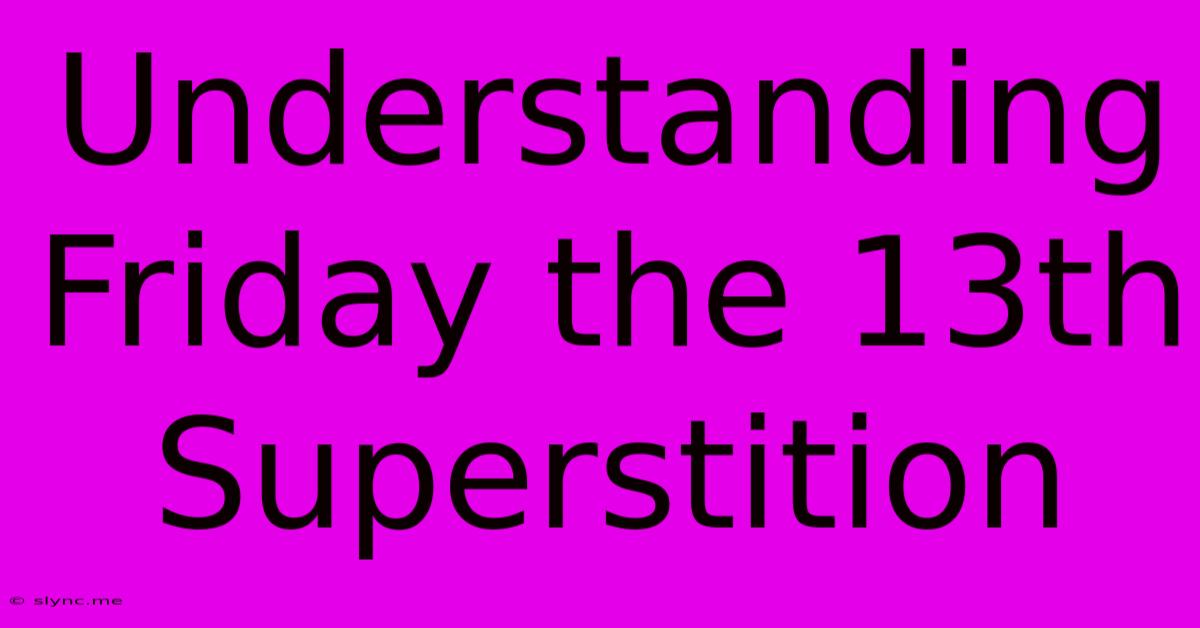Understanding Friday The 13th Superstition

Discover more detailed and exciting information on our website. Click the link below to start your adventure: Visit Best Website Mrs.Amykhan. Don't miss out!
Table of Contents
Understanding Friday the 13th Superstition: Unraveling the Myths and Fears
Friday the 13th. Just the phrase conjures images of black cats, broken mirrors, and looming misfortune. But where did this pervasive superstition originate, and why does it continue to hold such a grip on our collective imagination? Let's delve into the history and psychology behind this infamous day.
The Roots of the Fear: A Journey Through History
While the modern association of Friday the 13th with bad luck is relatively recent, the individual components – the fear of the number 13 (triskaidekaphobia) and the negativity surrounding Friday – have ancient roots.
The Number 13: A History of Unluck
The number 13's negative connotation spans numerous cultures and mythologies. In Norse mythology, 12 gods were dining when Loki, the trickster god, arrived as the 13th guest, leading to the death of Baldr, a beloved god. The Last Supper, with its 13 attendees, also contributes to the number's association with betrayal and tragedy. This cultural baggage has contributed significantly to the overall negativity surrounding Friday the 13th.
Friday's Negative Connotations
Friday itself has a long history of negative associations. In Christianity, it's the day of Jesus' crucifixion, cementing its association with death and sorrow. Across different cultures, Friday has held various negative connotations, influencing its current perception.
The Convergence: Friday the 13th
The specific combination of Friday and the 13th as a singularly unlucky day emerged more recently. Several theories exist, but no single definitive origin has been confirmed. One popular theory links it to the Knights Templar, who were arrested on Friday, October 13, 1307. Another points towards the publication of Thomas Mallory’s Le Morte d’Arthur, which featured the tragic death of King Arthur on Friday, further solidifying Friday’s unfortunate reputation.
The Psychology of Friday the 13th
The power of Friday the 13th isn't just about historical baggage; it's also a potent example of the psychological phenomenon of confirmation bias. People who believe in the superstition are more likely to notice and remember negative events that occur on this day, reinforcing their belief. This selective attention further strengthens the perceived correlation between Friday the 13th and misfortune, creating a self-fulfilling prophecy.
The Power of Suggestion and the Placebo Effect
Furthermore, the anticipation of bad luck can itself induce anxiety and stress, leading to increased caution and potentially even self-sabotaging behavior. This is akin to the placebo effect, where the belief in something's power influences the outcome. The mere expectation of misfortune on Friday the 13th can actually increase the likelihood of experiencing negative events, not because of any inherent power in the date, but due to the psychological impact of the belief itself.
Overcoming Friday the 13th Fears
While acknowledging the cultural significance and historical weight of this superstition, remember that it’s just that – a superstition. The day itself holds no inherent power to influence events. If you find yourself feeling anxious or apprehensive about Friday the 13th, try these approaches:
- Acknowledge and challenge your thoughts: Recognize the irrationality of your fear and actively challenge negative thoughts.
- Focus on positive self-talk: Replace negative thoughts with positive affirmations.
- Engage in activities you enjoy: Plan something fun and engaging to distract yourself.
- Remember it's just a day: Remind yourself that Friday the 13th is no different from any other day.
Ultimately, overcoming the fear of Friday the 13th involves understanding its origins and consciously working to break free from its grip on your mind. By challenging your beliefs and focusing on rational thinking, you can reclaim control and experience Friday the 13th as just another day of the week.

Thank you for visiting our website wich cover about Understanding Friday The 13th Superstition. We hope the information provided has been useful to you. Feel free to contact us if you have any questions or need further assistance. See you next time and dont miss to bookmark.
Also read the following articles
| Article Title | Date |
|---|---|
| Ding Liren Loses To Youngest Gukesh D | Dec 13, 2024 |
| Chelsi Zdolav Astanu 3 1 Video | Dec 13, 2024 |
| Post Lakers Flip Bronnys Career High | Dec 13, 2024 |
| Nightreign A New Elden Ring Experience | Dec 13, 2024 |
| Obstril Ukrayini Raketami Ostanni Novini | Dec 13, 2024 |
